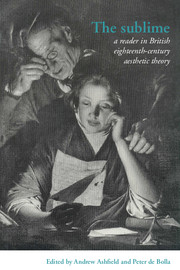Book contents
- Frontmatter
- Contents
- List of Abbreviations
- Introduction
- Part I The Longinian tradition
- Part II Rhapsody to rhetoric
- Part III Irish Perspectives
- Part IV The Aberdonian Enlightenment
- Part V Edinburgh and Glasgow
- 34 A treatise of human nature (1739-40)
- 35 A critical dissertation on the poems of Ossian (1763)
- 36 Lectures on rhetoric and belles lettres (1783)
- 37 Elements of criticism (1765)
- 38 Essays on philosophical subjects (1758/1795)
- 39 The theory of moral sentiments (1759/1790)
- 40 An essay on the history of civil society (1767)
- Part VI From the Picturesque to the Political
- Sources and further reading
34 - A treatise of human nature (1739-40)
Published online by Cambridge University Press: 05 June 2012
- Frontmatter
- Contents
- List of Abbreviations
- Introduction
- Part I The Longinian tradition
- Part II Rhapsody to rhetoric
- Part III Irish Perspectives
- Part IV The Aberdonian Enlightenment
- Part V Edinburgh and Glasgow
- 34 A treatise of human nature (1739-40)
- 35 A critical dissertation on the poems of Ossian (1763)
- 36 Lectures on rhetoric and belles lettres (1783)
- 37 Elements of criticism (1765)
- 38 Essays on philosophical subjects (1758/1795)
- 39 The theory of moral sentiments (1759/1790)
- 40 An essay on the history of civil society (1767)
- Part VI From the Picturesque to the Political
- Sources and further reading
Summary
Book II. Of the passions
Part III. Of the will and direct passions
Section VIII. Of contiguity and distance in space and time continued.
Thus we have accounted for three phenomena, which seem pretty remarkable. Why distance weakens the conception and passion: why distance in time has a greater effect than that in space: and why distance in past time has still a greater effect than that in future. We must now consider three phenomena, which seem to be, in a manner, the reverse of these: why a very great distance increases our esteem and admiration for an object: why such a distance in time increases it more than that in space: and a distance in past time more than that in future. The curiousness of the subject will, I hope, excuse my dwelling on it for some time.
To begin with the first phænomenon, why a great distance increases our esteem and admiration for an object; it is evident that the mere view and contemplation of any greatness, whether successive or extended, enlarges the soul, and [gives] it a sensible delight and pleasure. A wide plain, the ocean, eternity, a succession of several ages; all these are entertaining objects, and excel every thing, however beautiful, which accompanies not its beauty with a suitable greatness. Now when any very distant object is presented to the imagination, we naturally reflect on the interposed distance, and by that means, conceiving something great and magnificent, receive the usual satisfaction.
- Type
- Chapter
- Information
- The SublimeA Reader in British Eighteenth-Century Aesthetic Theory, pp. 199 - 206Publisher: Cambridge University PressPrint publication year: 1996
- 5
- Cited by



